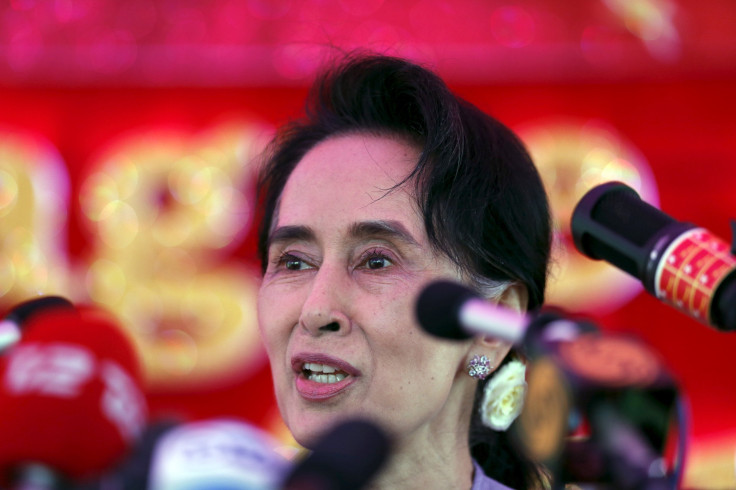Myanmar Election: Suu Kyi Fears 'Irregularities' As Ruling Party Leader Tips Her To Win

Myanmar opposition leader Aung San Suu Kyi said she fears Sunday's elections won't be clean because the polling agency isn't acting on irregularities. Many citizens and observers predict or hope the elections will usher in democracy for the first time since a military takeover in 1960.
"We have been very concerned by the lack of enthusiasm on the part of the Union Election Commission to hold free and fair elections," Bloomberg reported Suu Kyi as saying Thursday in Yangon. "We have repeatedly made complaints about the way in which some parties and individuals have been breaking the rules and regulations laid down by the election commission, but very little action has been taken."
There have been irregularities with some early-voting activities, she said. Suu Kyi made the statement just as the former head of Myanmar's ruling communist party said she has the people's backing.
Shwe Mann, who was ousted as head of the Union Solidarity and Development Party in August but remains speaker of the parliament and a party member, said he would even help Suu Kyi build a majority if her National League for Democracy doesn't get one on its own.
“The NLD has got the strongest support from the people,” the Guardian reported Shwe Mann telling reporters at his home in his first meeting with international journalists since his sacking by President Thein Sein. “Whenever Aung San Suu Kyi and I meet, we always talk about working together for the stability and development of the country. This cooperation will continue in the next parliament. We will work together for the country."
That could lead to his becoming president -- an ambition he has spoken of in the past -- because of a law that bars citizens married to foreigners -- Suu Kyi, a Nobel Peace Prize laureate, was married to British historian Michael Aris until he died in 1999 -- from the post.
“If members of parliament ask me, I’m ready to take any responsibility,” Shwe Mann said. “If they think I should be the president, I will be."
Suu Kyi said she would lead even if she can't be president.
"If the NLD wins the election and is able to form a government, I would lead it," Bloomberg reported her as telling reporters at her home. "I will be above the president. The constitution says nothing about someone being above the president."
Suu Kyi and her allies are drawing the biggest crowds, including tens of thousands who took part in a Yangon rally Sunday, Reuters reported, suggesting these serve as proxies for surveys in an election with no public polls.
Clean elections could help. About 200 election observers from former U.S. President Jimmy Carter's Carter Center and other organizations in the U.S., Europe and Asia, and 1,000 local monitors will ensure irregularities are known and discouraged, The Straits Times reported.
"If the rules are implemented, it will be a transparent process with a lot of eyes on it," the Straits Times reported Jonathan Stonestreet, leader of the Carter Center's Myanmar project, as saying.
Six thousand candidates from 91 parties are vying for 664 seats in parliament, not counting hundreds of seats in local assemblies, according to the Straits Times. About 30 million of the country's 50 million people can vote.
Suu Kyi's father Aung San negotiated independence from the U.K. -- the country was then known as Burma -- but was assassinated before the nation became free. Suu Kyi studied in Oxford, where she met Aris. She returned in 1988 and led her party in the 1990 elections, the first in 30 years, but the military nullified the results and put her under house arrest for most of the intervening years until 2010 when the military called an election, which Suu Kyi and her party boycotted. In 2012, she ran for and won a seat in parliament.
The house arrest and her 1991 Nobel Peace Prize helped Suu Kyi earn the label of an "icon of democracy" around the world. However, she has lost some of that aura since her release and has been criticized as being autocratic and for not speaking out enough for the Rohingyas -- a Muslim minority group in the country that has been persecuted by the majority Buddhists -- including by the Dalai Lama.
A clean election could lead to the full lifting of U.S. trade and investment sanctions, the Straits Times reported Deputy National Security Adviser Ben Rhodes as saying.
"There is a lot of benefit that has not yet come for Burma," Rhodes said. "If they clear this hurdle well," Rhodes said, there would be "a lot of potential benefit down the line."
The economy has picked up since the partial lifting of economic sanctions four years ago, with a 10-fold increase in foreign direct investment from 2009 to 2014, and 8 percent GDP growth rates, according to Bloomberg.
Still, per capita GDP is at about $1,200, compared with $5,400 for neighboring Thailand, according to IMF data.
"The potential is very clear. I think we’re living through a golden period,” Bloomberg quoted Melvyn Pun, CEO of Yoma Strategic Holdings, a conglomerate invested in a range of businesses including real estate and the country's first KFC restaurant, as saying.
“We really have been frozen in time for 50-odd years," Pun said. "Let’s be realistic, we’re not going to become Bangkok in five, 10 years. You have to look far enough."
© Copyright IBTimes 2025. All rights reserved.





















